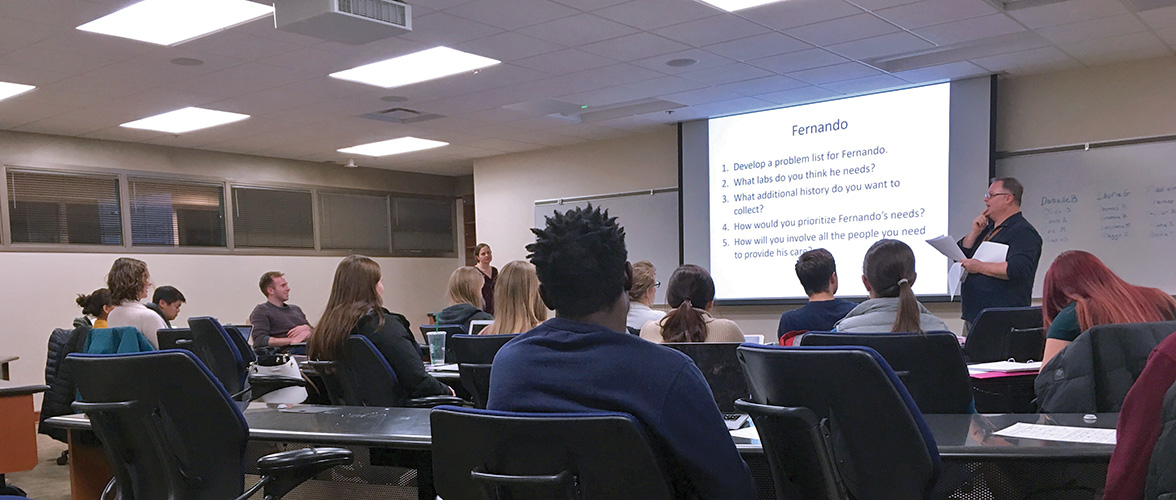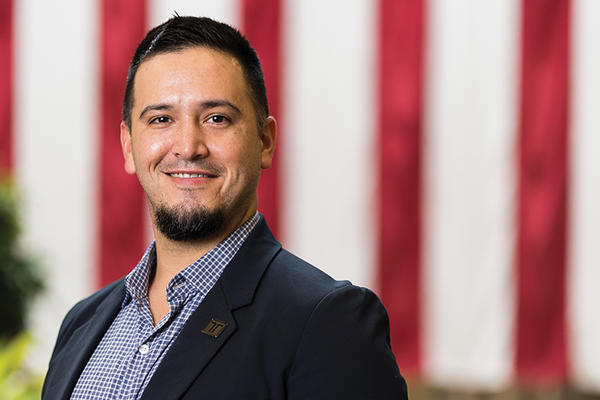It takes a team
As people with HIV live longer, a new interprofessional course educates the next generation of caregivers
October 17, 2019
Meleah Maynard

In the early days of the AIDS crisis, a diagnosis usually meant life would be dramatically shortened.
But according to recent research, improvements in antiretroviral agents and access to treatment mean that people living with HIV in Europe and North America can now expect to live a normal life expectancy. The key to longevity, researchers say, is ensuring people take their medication and receive up-to-date, well-coordinated care for the side effects and other health conditions they often experience, particularly as they age.
But providing that level of care is going to be challenging. Currently more than 1.1 million adults and adolescents in the U.S. have HIV and the Centers for Disease Control and Prevention estimates that nearly 40,000 Americans are newly infected each year. At the same time, many longtime HIV clinicians are retiring or preparing to retire, prompting the American Academy of HIV Medicine and other institutions to warn that the country is facing a critical shortage of HIV/AIDS-focused providers.
To help address this anticipated workforce shortage, the Midwest AIDS Training + Education Center (MATEC), with funding from the Health Resources and Services Administration (HRSA), began piloting an Interprofessional Collaborative Practice in HIV Care course in 2017. The course is taught by University of Minnesota faculty and gives students from the School of Nursing, Medicine, Pharmacy and Social Work an opportunity to share knowledge and learn the latest team-based HIV care strategies. “This program is so important because HIV is not just an infectious disease anymore. It’s a chronic illness that requires people to engage with the health care system for their entire lives,” said Nicole Benson, a project associate with MATEC.
Benson coordinates the 10-week course in collaboration with faculty from each of the four disciplines, including School of Nursing Clinical Professor Melissa Saftner, PhD, CNM, APRN, as well as MATEC Site Director Sarah Rybicki, MSW, MPH.
Students participate in classroom and online learning, clinical observation in HIV care settings and panel discussions—one with people currently living with HIV and another with a group of interprofessional practitioners. “Students like that they’re not only gaining knowledge about how to care for people with HIV/AIDS, they’re also learning about the complexities and challenges of HIV-related care and how a team-based, intercollaborative approach can benefit patients and practitioners,” said Benson.
Megan Danielson, who will graduate from the Doctor of Nursing Practice program with a specialty in adult gerontological primary care in 2020, recently completed the HIV Care course after working closely with HIV patients for the past two years as a registered nurse with the M Health Infectious Disease Clinic. “I really enjoy helping patients with HIV optimize their health and live their best lives, and the course was a great opportunity to enhance my knowledge of HIV care,” she said.
She appreciated the opportunity to interact with students from other disciplines. “We all had varying degrees of experience with HIV patients and HIV care, so the class felt like a big discussion and hearing other perspectives from students in pharmacy, medicine and social work helped me fill in the gaps where I needed help,” she said. Danielson also valued that the class challenged students to work interprofessionally as a team to create a plan of care for a hypothetical HIV patient. “It made it feel much more realistic to learn in a setting with students from other disciplines because these are the same professionals I will be working and interacting with as a nurse practitioner every day,” she said.
In addition to being an enriching learning experience for students interested in HIV care and other health-related fields, the course also offers needed insight into the barriers and challenges HIV patients face and promotes a better understanding of the health and government policies that impact HIV care. Currently at the end of its first four-year funding cycle, MATEC recently received a new five-year grant from HRSA and Benson expects the course will continue to expand and grow. “Whether they want to go into HIV care or not, students say the class shows them the value of interprofessional practice and they tell me, ‘That’s how I want to practice,’” she said.


